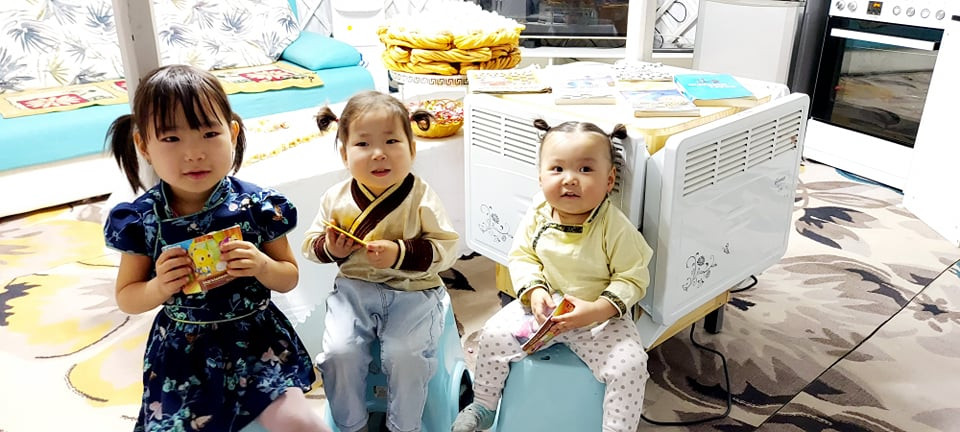Families go coal-free in Mongolia
Published: Jun 16, 2021 Reading time: 5 minutes Share: Share an article
“There were many times when I had to leave the children back at home to run errands. Each time I would worry about how they were doing, if they were cold or if they would accidently get burned by the stove. But now, I no longer have to worry,” says Baasankhuu, a resident of Esonbulag soum in Gobi-Altai province. Her family is a recipient of of the Cooking, Heating and Insulation Package designed by UNICEF.
Mongolia’s second-largest province, Gobi-Altai, is also one of the four most-polluted provinces in the country. The city of Altai, the provincial center has consistently high recordings of PM2.5 during the winter months, exceeding WHO accepted safe levels. With thousands of households burning coal to stay warm in the long winter months, the stoves contribute to a thick smog of toxic particles - putting their children and unborn children at risk of indoor air pollution.
To tackle this issue, UNICEF, together with experts from the Mongolian University of Science and Technology (MUST), worked closely in consultation with the local government and community, to introduce the CHIP package with the financial support from Swiss Agency for Development and Cooperation.
The package replaces the heavy black chimney with a shiny white ventilation pipe, an energy-efficient electric heater instead of a traditional coal stove. Other additions include circular air filters on the door and extra layers of windproof and waterproof insulation around and under the ger. All this designed to improve energy efficiency and indoor air quality in traditional gers as well as reduce outdoor and indoor air pollution. Since then, CHIP has been installed in over 492 households and two large ger (or yurts) kindergartens.
Combating negative impacts of air pollution through innovative insulation solutions
Ms.Baasankhuu has raised her children in the province capital. Her husband works as delivery-man and driver for one of the local branches of a large company. Their three older children, a 12 year old Turmunkh, a 9 year old and a 7 year old Gantigma, go to public school. She is a stay-at-home-mom and looks after her youngest daughter, a 3 year old Undram.
“Ever since we had the CHIP package installed, we have experienced nothing but positive changes. Our ger holds heat very well now and because of this my children are always warm, which for me is the biggest positive side. Another thing that makes me happy is that we get to contribute in a small way towards cleaner and healthier air in Gobi-Altai.” says Baasankhuu.
Another household also share their transition after becoming a CHIP household. Namuuntsetseg, from Umnigobi province, recently gave birth to a healthy baby boy. “Our family welcomed a baby boy in October 2020 but we were still using coal to heat up our home back then. It was a constant struggle to keep the house at a regular temperature and because of this our infant baby was at risk of being either too cold or too hot. Not to mention having to get up early every morning to make sure the ger was warm when the children woke up,” Namuuntsetseg shared.
There are still many families in Gobi-Altai and Umnigobi who use coal stoves, and for them there are immediate dangers to their health. Burning both wood and coal inside the home produces particulate and gas emissions that may contain chemicals such as benzene and carbon monoxide. It leads to serious health problems, especially for children and pregnant women.
A recent study by UNICEF found that air pollution potentially affects children’s brains as particulate matter (particulate matter that is equal to or less than 2.5 microns in diameter) pose an especially high risk because they can more easily enter the bloodstream and travel through the body to the brain.
“Installing the CHIP package has solved all of our problems. Now I get to control the heating temperature and it has been great for my children. And I no longer have to wake up early, constantly going in and out to prepare the coal for fire,” continues Namuuntsetseg.
While Namuuntsetseg no longer has to worry about the arduous task of keeping her family warm and healthy, there are still countless cases where too often a woman will have to stay home, bound to daily household chores.
Bridging the gender divide
Although men can and do manage this grueling task, the burden falls mostly on the shoulders of women. Daily and constant upkeep is required for the most fundamental of human rights - warmth and adequate food. However, thanks to CHIP, women just like Baasankhuu and Namuuntsetseg can be freed of the demanding chores of keeping the coal stove heated during the long winter months.
Tackling air pollution and its many hazards, with irreversible effects on the health of many children and pregnant women, is no easy task.
Despite the long road ahead, there have been numerous achievements in the battle to reduce air pollution in Mongolia. With the immense support of the Government of Mongolia, Swiss Agency for Development and Cooperation and the continuous work of our partners like MUST, People in Need, Mongolian Sustainable Finance Association (MSFA); These organisations have further scaled this innovative technology to bring CHIP to more households in urban communities across Mongolia. Even now, in the midst of a worldwide pandemic, they continue their work so that the children can once again grow up under blue skies.
